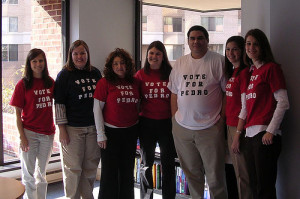 The Maryland State Board of Elections (MSBE) voted last week to adopt rules regulating social media pages and online advertising supporting political candidates’ campaigns. The unanimous decision requires campaigns to add a disclosure sentence to their blogs and to profiles on sites like Facebook and Twitter. The disclosure requirements are the same as for printed materials; the campaign committee funding the material must be identified, and the group’s treasurer must be named.
The Maryland State Board of Elections (MSBE) voted last week to adopt rules regulating social media pages and online advertising supporting political candidates’ campaigns. The unanimous decision requires campaigns to add a disclosure sentence to their blogs and to profiles on sites like Facebook and Twitter. The disclosure requirements are the same as for printed materials; the campaign committee funding the material must be identified, and the group’s treasurer must be named.
A panel of legislators must now approve the measure. If approved, violators could receive $1,000 fine or one year in prison.
There are some exceptions for who must carry the disclosure, such as:
- Private citizens who are unaffiliated with a candidate or campaign
- Government sites
- Online ads containing less than 200 words — but the ads must include a link to a website that includes the full sentence
- Facebook ads, as long as they link directly to an official campaign website regulated by the MSBE
Kate Kaye, who covers politics for ClickZ, describes other guidelines developed by the MSBE:
A particularly unique component of the Maryland draft rule is a requirement for each of the campaign’s online ads to be stored in paper or a non-rewriteable electronic format for at least a year after the general election following the date when the campaign material was distributed. Text messages or social media posts — including blog posts, videos, photos, and podcasts — would have to be stored in a detailed log marking the date and content of the communication.
Maryland is one of the first states to regulate candidates’ presence on the Web. “We knew that what we were working on would become a model for the country,” said Bradley Shear, an attorney who assisted the MSBE in drafting its guidelines. Andrew Noyes, a spokesman for Facebook, called the regulations a “victory.”
Wisconsin and California are also considering similar rules. Florida recently adopted its own guidelines, which are in pretty stark contrast to Maryland’s. Governor Charlie Crist signed into law a bill that allows candidates to place online ads with no requirements for standard disclosure language.
Source: “Board to campaigns: If you post it online, put your name on it,” The Baltimore Sun, 06/03/10
Source: “Maryland Rule May Ask Political Campaigns to Store Twitter, Facebook Posts,” ClickZ, 06/03/10
Source: “Florida modernizes campaign laws to reflect new technology,” Google Public Policy Blog, 06/01/10
Image by pvera, used under its Creative Commons license.